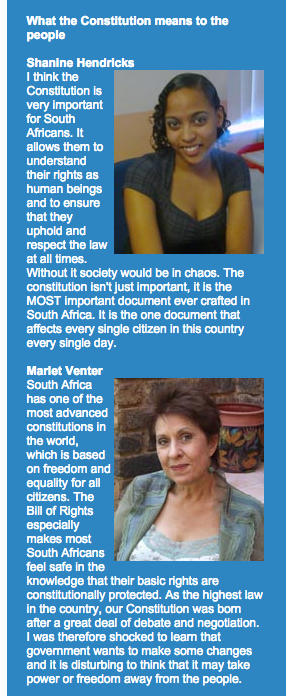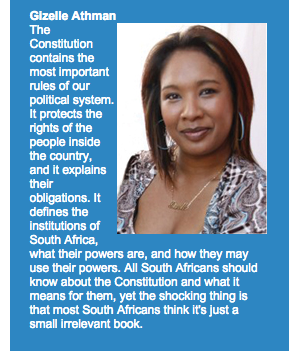We, the people of South Africa
We, the people of South Africa sadminAdvice and Events
The theme for this year's Freedom Day is "Joining hands to celebrate 100 years of struggle for human rights and constitutional democracy". As such, the spotlight falls on South Africa's Constitution, which exemplifies human rights, democracy and freedom.
The theme for this year's Freedom Day is "Joining hands to celebrate 100 years of struggle for human rights and constitutional democracy". As such, the spotlight falls on South Africa's Constitution, which exemplifies human rights, democracy and freedom.
"We, the people of South Africa, recognise the injustices of our past; honour those who suffered for justice and freedom in our land; respect those who have worked to build and develop our country; and believe that South Africa belongs to all who live in it, united in our diversity."
These words from the preamble of South Africa's Constitution, refer to the fundamental human rights included in the Constitution.
South Africa's Constitution is widely recognised as one of the most progressive in the world. Human rights occupy pride of place in the Constitution with the Bill of Rights having attracted interest worldwide.
Contained in Chapter 2, the Bill of Rights is the part of the Constitution that has had the greatest influence on South Africans. The first words of the chapter introduce the Bill of Rights as a "cornerstone of democracy" that enshrines the rights of all South Africans."
Among other things, it protects our freedom and our dignity; it promotes equality, tolerance, responsible behaviour and respect for human life and supports all the other values in the Constitution.
SA first
Among the rights included in the Bill of Rights are the right to life, equality, human dignity, freedom of expression, freedom of religion, freedom of association, political rights and the right to peaceful assembly and demonstration.
These are the "first generation" rights, which are guaranteed in most democratic countries.
However, a distinctive feature of our right to equality is that it includes a prohibition against unfair discrimination based on sexual orientation. South Africa is the first country in the world to insert such a clause in its Constitution.
Our Bill of Rights also contains socio-economic rights, or "second generation" rights. These place a duty on government to work to provide education, health services, water and housing.
The last group of rights in the Bill of Rights, the "third generation" rights, has also attracted admiration for our Constitution. They include the right to having the environment protected, the right of access to information and the right to just administrative action.
The rights conferred by the Constitution have been the basis of a number of ground-breaking court cases. Examples include cases involving the rights for women, children, workers and gays and lesbians.
Supporting democracy
Another significant feature of our Constitution is that it has set up several independent bodies to support and safeguard democracy.
These are the:
- Auditor-General
- Commission for the Promotion and Protection of the Rights of Cultural, Religious and Linguistic Communities
- Commission on Gender Equality
- Human Rights Commission
- Independent Electoral Commission
- Public Protector
Collective wisdom
South Africa's Constitution was signed into law on 10 December 1996, and took effect on 4 February 1997. It is the supreme law of the land and no other law or government action can supersede the provisions of the Constitution.
The Constitution represents the collective wisdom of the South African people, as it has been arrived at by general agreement.
The process of drafting the Constitution involved many South Africans in the largest public participation programme ever carried out in South Africa.
After nearly two years of intensive consultations, political parties represented in the Constitutional Assembly negotiated the formulations contained in this text. It represents an integration of ideas from ordinary citizens, civil society and political parties from inside, as well as outside the Constitutional Assembly.
-Louise van Niekerk